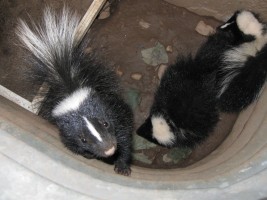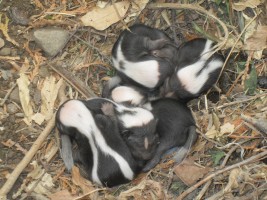Why Skunks are attracted to your home
Skunks cannot climb so they make their dens at ground level. Skunks tend to burrow out their dens in cavities below structures on properties, such as concrete front steps, wooden porches, decks, sheds, and home additions that do not have foundations. They are nocturnal (i.e. active at night), and will chew or burrow through wood and siding. Their burrows can cause weaknesses in the structures.
Freshly planted or laid lawns are hot spots for both raccoons and skunks, especially fresh sod. In the fall and all during the growing season, skunks are on the patrol for earthworms, grubs and a variety of soil insects. Their diets also include crayfish, small animals, birds and their eggs, frogs and turtle eggs – if they can find them. Skunks enjoy a diet that extends into fallen fruit like mulberries, raspberries, cherries and grapes. They don’t jump and cannot climb to any extent, so they work close to the ground.
It is more likely you will smell a skunk than see one. Persistent, faint musk smells under a building or woodpile may suggest that a skunk has taken up residence. You may find small, shallow holes in the lawn, similar to those made by squirrels, which are a result of a skunk foraging for grubs and insect larva.
You may also find plants knocked over or damage to the lower leaves or ears of ripening garden crops, including corn. You should look for other clues as well because foxes also have their own musky scent that may cause misidentification.
Occasionally a skunk will wander into an open garage or shed, a compelling reason to secure all outbuildings.
Skunks spend prolonged periods inactive inside their dens during winter which can make their removal difficult. It is important to try and remove them in fall before the ground freezes.
How to get rid of skunks
Skunk dens are often hard to access and a number of extraction techniques may be required. Killing or capturing the adult likely won’t solve the problem, since the babies may still be hiding in an inaccessible area under the building. Signs of digging and burrowing are the most common way to locate a skunk den. If a skunk sprays under the front step the odour can easily find its way into the home and won’t dissipate for months.
Checking under your porches, sheds, patios and crawl spaces for openings that need to be sealed can keep skunks from coming into your home in search of food as well. If you have trees or bushes that harvest fruits, berries or nuts, check your yard often in search of those that have fallen on the ground and remove them. Remove all water sources that skunks can easily access as well. Make sure all garbage bins are securely sealed, and pet food is stored securely.
Why trapping skunks is not the answer:
In Ontario, it is illegal to trap and relocate animals from the site where they were captured according to the Ministry of Natural Resources’ Fish and Wildlife Conservation Act.
- Live-trapping causes great stress for the trapped animal, and they may seriously injure themselves as they desperately attempt to escape
- More animals will come and re-occupy the space the previous animal lived in.
What if there are baby skunks?
Most baby animals found are not mobile for several weeks to months after birth. That means the only way to remove them humanely is by hand. This method is both effective and significantly reduces any chance of injuring them. Once the babies have been retrieved, they are placed inside a specially designed and heated reunion box. This baby reunion box is designed so that it can be placed near the entry point so their mom can come back and get them.
The key to getting the animals out from under these steps permanently is to block access. A Skedaddle Humane Wildlife Control technician will be able to tell you what work might be required to get the animals out and to keep them out, and to make you aware of potential issues that may be unseen behind the steps. Skedaddle Humane Wildlife Control digs a trench and uses heavy-gauge screening to prevent skunks from gaining entry under porches, sheds, and anywhere without a foundation. They can be very persistent, so making sure you’re hiring someone with experience is the only way to combat those digging skunks!
If you think you have a skunk problem, call Skedaddle Humane Wildlife Control today. 1-888-592-0387.
Proudly serving: Ottawa, Montreal, Halifax, Hamilton, Burlington, Oakville, Mississauga, Brampton, Kitchener-Waterloo, Guelph, Cambridge and the Niagara Region.




